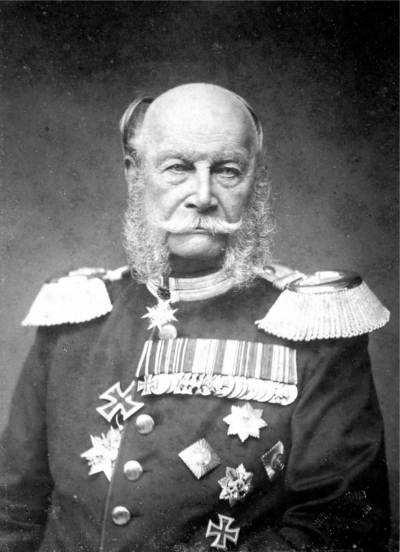The Constitution of the German Confederation (German: Verfassung des Deutschen Bundes) or November Constitution (Novemberverfassung) was the constitution of the German federal state at the beginning of the year 1871. It was enacted on January 1, 1871. This is a slightly changed version of the Constitution of the North German Confederation; it is not to be confused with the constitutional laws of the German Confederation of 1815.
The Constitution of the German Confederation of 1871 incorporated agreements between the North German Confederation and some the South German states that joined the Confederation: with Baden and Hesse-Darmstadt, but not Bavaria and Wrttemberg. The new constitution appeared on 31 December 1870 in the Bundesgesetzblatt des Norddeutschen Bundes (North German Federal Law Gazette) and came into effect the following day.
New elections to the Reichstag, the parliament, took place on 3 March. They included for the first time the South German states, also Wrttemberg and Bavaria. On 16 April 1871 the constitution was replaced with a new constitution which was in effect until the end of the German Empire in 1918.
There are four different constitutions or texts to distinguish between:
The 'Constitution of the North German Confederation' (Verfassung des Norddeutschen Bundes, Norddeutsche Bundesverfassung, NBV) from 16 April 1867. It came into effect on 1 July 1867.
The 'Constitution of the German Confederation' (Verfassung des Deutschen Bundes) as a text which was added to one of the November treaties: the agreement between the North German Confederation and Hessen-Darmstadt and Baden.
The 'Constitution of the German Confederation' (Verfassung des Deutschen Bundes, Deutsche Bundesverfassung, DBV) as the constitutional text which appeared in the Federal Law Gazette on 31 December 1870. The Constitution, in spite of its title, already names the federal state 'German Empire' (Deutsches Reich). It came into effect the following day, 1 January 1871.
The 'Constitution of the German Empire' of 16 April 1871, which came into effect on 4 May 1871. This is usually the constitution called the Bismarcksche Reichsverfassung (BRV or RV).In all of those four texts, the political system remains the same. The changes relate mainly to the agreements with the South German states regarding their accession to the North German Confederation. For example the number of delegates to the Federal Council were adjusted. All this was executed in a rather messy way. Constitutional historian Ernst Rudolf Huber called the constitution of 1 January 1871 a 'Monstrum'.The constitution of 1 January 1871 was one step from the North German Confederation to the German Empire. Those steps did not create a new state but concerned the accession of the South German states. The North German Confederation was renamed, and some of its organs received a new title. The constitution of 1 January 1871 did have lasting significance in the German Empire despite of the new constitution of 16 April 1871: article 80 (not repeated in the constitution of 16 April) made many North German laws come into force also in the South.
William I or Wilhelm I (German: Wilhelm Friedrich Ludwig; 22 March 1797 – 9 March 1888) was King of Prussia from 2 January 1861 and German Emperor from 18 January 1871 until his death in 1888. A member of the House of Hohenzollern, he was the first head of state of a united Germany. He was de facto head of state of Prussia from 1858, when he became regent for his brother Frederick William IV, and he became king when his brother died three years later.
Under the leadership of William and his minister president Otto von Bismarck, Prussia achieved the unification of Germany and the establishment of the German Empire. Despite his long support of Bismarck as Minister President, William held strong reservations about some of Bismarck's more reactionary policies, including his anti-Catholicism and tough handling of subordinates. In contrast to the domineering Bismarck, William was described as polite, gentlemanly and, while staunchly conservative, more open to certain classical liberal ideas than his grandson Wilhelm II, during whose reign he was known as Wilhelm the Great (German: der Große).

1871Jan, 18
Wilhelm I of Germany is proclaimed Kaiser Wilhelm in the Hall of Mirrors of the Palace of Versailles (France) towards the end of the Franco-Prussian War. Wilhelm already had the title of German Emperor since the constitution of 1 January 1871, but he had hesitated to accept the title.
Choose Another Date
Events on 1871
- 28Jan
Siege of Paris (1870-71)
Franco-Prussian War: The Siege of Paris ends in French defeat and an armistice. - 17Feb
Siege of Paris (1870-71)
The victorious Prussian Army parades through Paris, France, after the end of the Siege of Paris during the Franco-Prussian War. - 21May
Bloody Week
French troops invade the Paris Commune and engage its residents in street fighting. By the close of "Bloody Week", some 20,000 communards have been killed and 38,000 arrested. - 28Sep
Slavery in Brazil
The Brazilian Parliament passes the Law of the Free Womb, granting freedom to all new children born to slaves, the first major step in the eradication of slavery in Brazil. - 8Oct
Great Chicago Fire
Four major fires break out on the shores of Lake Michigan in Chicago, Peshtigo, Wisconsin, Holland, Michigan, and Manistee, Michigan including the Great Chicago Fire, and the much deadlier Peshtigo Fire.

 English
English  español
español  français
français  português
português  русский
русский  العربية
العربية  简体中文
简体中文 